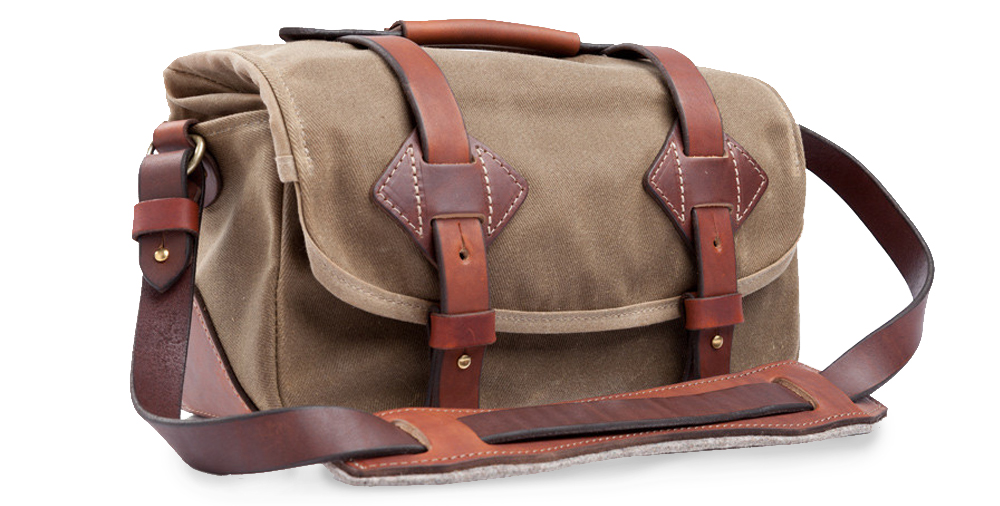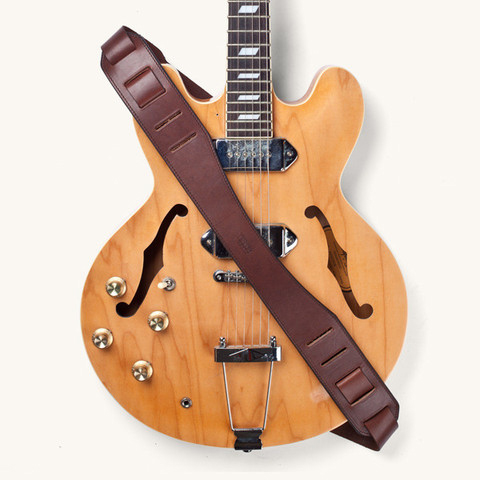

Dave Gans
December 08, 2014
Unlike the 20 minutes spent in a UV box to acquire a superficial bronze to complement one's superficial personality, tanning leather is a process that takes time and skill.
To continue our pursuit of identifying brands that meet the Made in America criteria, we move from the elegant wooden products of WOODCHUCK to the fine leather goods of Portland's own, Tanner Goods.
Klipsch got on the horn (audiophile-pun intended) with Sam Huff, Creative Director/Co-Founder of Tanner Goods to talk about their inspiration, materials used and what music they're listening to when tanning the day away.
Why do you choose to make your products in the U.S.A?
For us, the who, what and where of our goods' production has more to do with quality and localization than it does about waving a flag around. Quality is paramount for us, so producing the majority of our product in-house allows us to control quality in a way we couldn't if another factory was handling things. And honestly, this goes for our entire operation, top to bottom. Virtually everything is done in-house, from the earliest parts of the design all the way through the production and marketing. We like having control of things, start to finish. You know the old adage, "If you want something done right..."
In the instances where we don't have the expertise to produce something on our own, we look close to home for a manufacturing partner. This too allows us to keep close watch over the quality at which our products are manufactured, but also keeps money in our own local economy. I think a great example of this are the notebooks and sketchbooks we produce. Each is made right up the road by a family-run print and binding shop. We pay a slight premium for producing it here in Portland, but the upshot is that we can literally walk up the street and meet face to face to discuss projects. We can see the books being made on the spot, and in a time where so much business is done over the phone or internet, there's something special and putting a face and a handshake behind a commitment.
Why is leather such an important material to work with?
Leather has a historic significance that's true in both a wide, mass appeal sense as well as a personal sense. It's a material that is unmatched in it's versatility and longevity. If I think back to some of my most well-worn items over the years -- a baseball glove from my youth, a pair of boots I've used for backpacking over the years or a set of Wassily chairs that were handed down from my wife's parents -- I can't imaging another material that I've used in so many different ways over so many years.
It's also incredibly simple in structure yet can be formed, cut and sewn into very complex items. And after years of use, it's one of the only materials I can think of that continues to gain beauty and character over time.
 "Our Operations Director is always turning down the speaker during meetings so he can concentrate better. I’m turning it back up when he’s not looking."
"Our Operations Director is always turning down the speaker during meetings so he can concentrate better. I’m turning it back up when he’s not looking."What products do your customers seem to enjoy the most?
That's one of the most common questions I get asked (as well as one of the hardest ones to answer), but here goes nothing...
If I look at numbers of specific styles we sell, the amazing thing to me is how evenly split things are across all categories -- wallets, belts, bags, etc. We encourage our customers to share images of their worn items, and if anything I'd wager it's the evolution they enjoy more than anything else. Each product we make starts out the same as the next, but the real beauty is in the unique patina each takes on over time. It's a reflection of the owner's lifestyle.
Where do you get your inspiration?
As trite as it sounds, I find most inspiration from my immediate environment. All of our products start as a need we identify in our own lives; we're always looking at the items we interact on a daily basis and ask, "Could this be done better?"
Things like our cycling collection or incorporation of music into our digital and retail environments isn't a strategic thing. We don't sit down and go, "Oh man, this is gonna be so on-trend next season!" For us, it's a way for us to develop products and experiences that tie into our own passions. I put it like this -- if someone produces something he or she is passionate about, and has a deep understanding of what is lacking or missing, the design execution is going to be ten times better than someone that is just doing it to do something "cool."
Tanner Goods as a brand is really a reflection of my business partner's and my own interests. Beyond the core product we offer -- which really focuses on those items used day in, day out like wallets and belts -- developing new products has a lot to do with what activities and interests are big parts of our lifestyle. We both spend a lot of time hiking and camping in the wilderness here in the northwest. We both cycle to work and on the weekends for recreation. We dig for vinyl, have a strong appreciation for art, design and architecture. Finding ways to tie all these elements together is best part of the work we do.
How long have you been working to perfect your product and craft?
In some form or another, I'd say I've been working towards where I am now the better part of my life. It's hard to draw a linear line, but I've always been drawn to creative endeavors, especially those that involve getting my hands dirty. I can't tell you how many forts I built as a kid out in the woods behind my house. I remember my mom saving up enough money to allow my brother and I to take art classes as a kid, and it's one of the gifts I treasure the most. It started me down the path I'm still following today.
But It wasn't until I was 14 or 15 that I started working with clay and studying pottery, and that for me was a big turning point where I realized my passion wasn't so much about creating art as it was about creating products. Pottery was that sweet spot where functionality, utility and creativity existed.
I ended up studying product design in college, and after graduating and working for a couple small design consultancies in Portland, I realized the creative side of me was fulfilled but the actual execution of what I was designing wasn't. That motivated me to get back to my roots in a sense and join up with an old friend from my hometown to create Tanner Goods.
Over the past 8 years I've learned a ton, some by trial by fire but a large portion was from the guidance and mentorship of a guy named LP Streifel. He's sort of in the twilight of his career as a saddle maker, but was kind enough to help pass along relevant parts of his trade to us. We figured if the construction techniques were strong enough to work for saddles, adopting those to our own work wouldn't be a bad move.
What motivated you to start your business?
Well, I think it really came down to two things. The first is that drive I talked about earlier to not only design, but also create. The second is a genetic tendency towards being my own boss. Growing up in an environment where my parents and grandparents were both entrepreneurs (my business partner's parents were, too) left a big impression on me as a kid. I don't think I ever really imagined working under someone else for any length of time.
I like being in control of my own fate. I like answering to myself, because if something doesn't work out it's ultimately on my shoulders. But this "be my own boss" talk is only one part of the reality -- there are really three of us who work together to steer the ship. The dynamic is great though because while we all have complimentary expertise in sales, operations and creative direction, we're all essentially on the same page with what we want to accomplish. If we have a concept we're confident in at Tanner Goods, we go out and execute it. Having our own business really allows us to be as audacious as we want to be, without sacrificing or compromising our vision.
How is music integrated into your life?
It's completely intertwined with my daily routine. Hopping in the shower and turning on some tunes is the first thing I do in the morning, and playing a handful or 45s or an LP in the evening is one of the last things I do before I hit the hay. Our Operations Director is always turning down the speaker during meetings so he can concentrate better. I'm turning it back up when he's not looking. That about sums it up.
What are you listening to right now?
The Kinks -- Lola Versus Powerman
When you are working, what do you listen to?
Everyday is different for me. I have a pretty eclectic taste in music, so my music choices are usually dictated by what I'm working on or what mood I'm in at any given moment. I usually turn on the local jazz station when I get up to ease me into the day, and continue listening to that the first hour or two at work. I'll flip between a few online radio streams throughout the day -- WFMU from Jersey for the strange and eclectic, KEXP from Seattle for new and old indie rock and WEFUNK from Montreal for a mix of soul, funk and 80's / 90's hip hop.
Why do you like working with other Made in America Brands?
On a basic level, they closely share our ideals. Quality, localization and continuing a strong tradition of manufacturing here in the states are all very important things to our partners and us alike. At the end of the day, I like knowing where my things come from and who stands behind them.
Got a favorite leather good that's aged to perfection? What other products do you know or own that can proudly say are made in America? Tell us below.
Categories: Made in America Craftsmen


